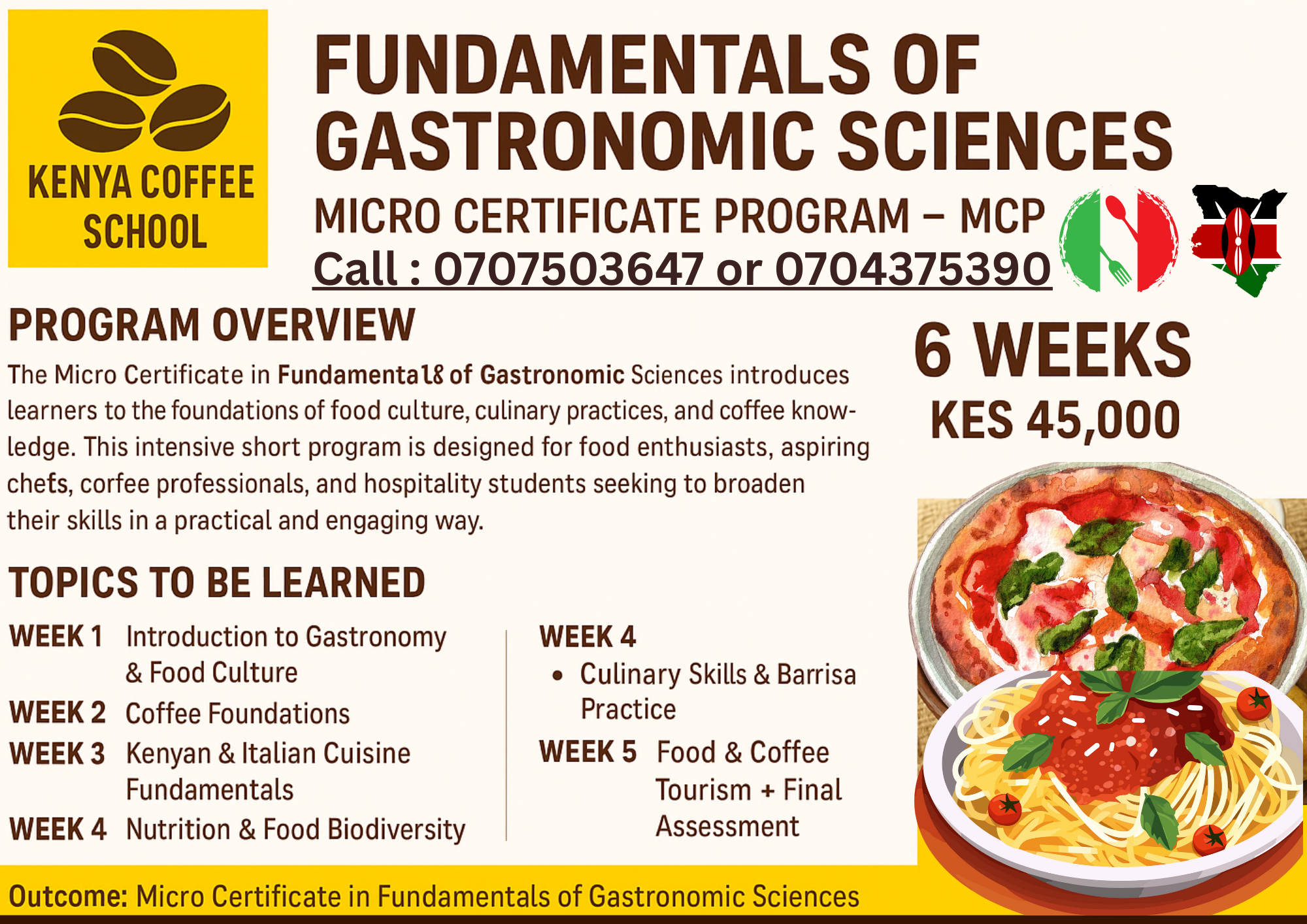Kenya Coffee School
Introduction to the KCS Diploma in Gastronomic Sciences :
Fundamentals of Gastronomic Sciences (Micro Certificate Program – MCP)
Duration: 6 Weeks
Full Fee: KES @ 65,000

Program Overview : Call 0707503647 or 0704375390
The Micro Certificate in Fundamentals of Gastronomic Sciences introduces learners to the foundations of food culture, culinary practices, and coffee knowledge. This intensive short program is designed for food enthusiasts, aspiring chefs, coffee professionals, and hospitality students seeking to broaden their skills in a practical and engaging way.
Topics to be Learned (Week-by-Week)
Week 1: Introduction to Gastronomy & Food Culture
- What is Gastronomy?
- Food as culture and identity
- Global vs. local food traditions
- Kenyan cuisine heritage
Week 2: Coffee Foundations
- History & origins of coffee
- Coffee varieties and processing methods
- Introduction to coffee tasting (cupping)
- Coffee brewing basics (French press, pour-over, espresso intro)
Week 3: Kenyan & Italian Cuisine Fundamentals
- Signature Kenyan dishes (ugali, sukuma wiki, nyama choma, githeri) Kenyan / Texas Berbecue/ Traditional Foods
- Italian classics (pasta, pizza, risotto, Aged Meats (Salami), Kombucha, Wine
- Comparative cooking labs
- Food and culture exchange
Week 4: Nutrition & Food Biodiversity
- Principles of human nutrition
- Food biodiversity in Kenya (indigenous vegetables, cereals, legumes)
- Sustainable food systems
- Farm-to-table philosophy
- Food combining,” also known as food pairing, is a dietary practice that suggests certain foods digest better when consumed in specific combinations, while others should be eaten separately.
Week 5: Culinary Skills & Barista Practice
- Kitchen fundamentals (knife skills, mise en place, hygiene)
- Cooking methods: boiling, steaming, grilling, roasting
- Fish & Other Foods
- Espresso preparation & milk steaming
- Intro to latte art
Week 6: Food & Coffee Tourism + Final Assessment
- Food and coffee in tourism
- Study case: Kenyan coffee farm experience
- Students design a mini food/coffee tourism concept
- Final assessment: practical demo + short presentation
Outcome
Graduates of the Micro Certificate Program (MCP) will be able to:
- Understand the fundamentals of gastronomy and food culture
- Demonstrate introductory culinary and barista skills
- Appreciate the role of biodiversity and nutrition in food systems
- Connect coffee and cuisine to tourism and hospitality
Award: Micro Certificate in Fundamentals of Gastronomic Sciences (KCS)
Kenya Coffee School Semester (A) (Months 1–6): Certificate Modules (as above) School Fees : Full Fee Kenya Shillings @115k
Certificate in Gastronomic Sciences (6 Months)
Module 1: Introduction to Gastronomy & Coffee Studies
- History and definition of gastronomy
- Role of food in culture and society
- Coffee origins, varieties, and processing
- Learning Outcomes: Students understand the basics of food culture and coffee.
- Assessment: Class presentations + short quiz
Module 2: Kenyan & Italian Cuisine Fundamentals
- Overview of Kenyan cuisines (ugali, nyama choma, sukuma wiki, githeri)
- Italian cuisines (pasta, pizza, risotto)
- Comparative cooking labs
- Learning Outcomes: Students acquire culinary preparation skills.
- Assessment: Practical cooking demos
Module 3: Nutrition & Food Biodiversity
- Basics of human nutrition
- Biodiversity in Kenyan food systems
- Food security & sustainability
- Learning Outcomes: Students can explain nutrition foundations and local biodiversity.
- Assessment: Written test + recipe project
Module 4: Coffee & Barista Foundations
- Coffee brewing methods (espresso, pour-over, French press)
- Barista basics (milk steaming, latte art intro)
- Coffee tasting (cupping)
- Learning Outcomes: Students gain beginner barista skills.
- Assessment: Practical skills test
Module 5: Food & Coffee Tourism
- Role of food and coffee in tourism
- Case studies: Kenyan coffee farms, Italian culinary tours
- Study Trip: Coffee farms (Kiambu, Nyeri)
- Learning Outcomes: Students understand tourism linkages.
- Assessment: Field trip report
Module 6: Final Project & Assessment
- Capstone: Develop a small food/coffee tourism concept (e.g., farm-to-table café)
- Oral defense + practical demo
- Outcome: Certificate in Gastronomic Sciences
Kenya Coffee School Semester (B) (Months 7–12): Advanced Modules : Full Fee Kenya Shillings @225k
Module 7: Advanced Gastronomy & Culinary Innovation
- Modern gastronomy (molecular, fusion, farm-to-table)
- Innovations in Kenyan cuisine
- Assessment: Create a modern Kenyan dish with innovation
Module 8: Advanced Coffee Science & Sensory Analysis
- Espresso mastery, brewing variables, latte art
- Sensory science & flavor analysis
- Assessment: Cupping exam + barista performance test
Module 9: Food Biodiversity & Sustainability Studies
- Agroecology & biodiversity in Kenya
- Sustainable food systems
- Study Trip: Browns Cheese (Limuru), Sirimon Cheese (Nanyuki)
- Assessment: Sustainability case study
Module 10: Food Communication & Entrepreneurship
- Food media, blogging, storytelling
- Starting a food/coffee business
- Costing, menu design, marketing
- Assessment: Business plan presentation
Module 11: Industry Attachment
- Internship at hospitality institutions, farms, wineries, or cafés
- Professional mentorship by Barista Mtaani
- Assessment: Internship logbook + supervisor evaluation
Module 12: Final Research Project
- Research in food tourism, coffee culture, or gastronomy
- Written dissertation + oral defense
- Outcome: Diploma in Gastronomic Sciences
